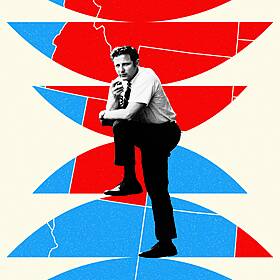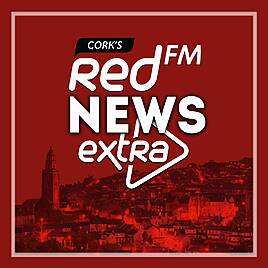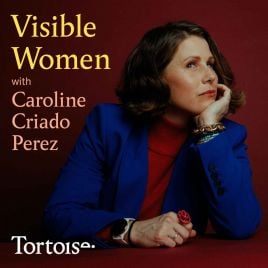
The Unpopular Vote
25 October - 59 minsAs the US Presidential Election nears, Radiolab covers the closest we ever came to abolishing the Electoral College.
In the 1960s, then-President Lyndon Johnson approached an ambitious young Senator known as the Kennedy of the Midwest to tweak the way Americans elect their President. The more Senator Birch Bayh looked into the electoral college the more he believed it was a ticking time bomb hidden in the constitution, that someone needed to defuse. With overwhelming support in Congress, the endorsement of multiple Presidents, and polling showing that over 80% of the American public supported abolishing it, it looked like he might just pull it off. So why do we still have the electoral coll...

Science Vs: The Funniest Joke in the World
When he rounded them up, he had a 100. A few months ago, Wendy Zukerman invited our own Latif Nasser to come on her show, and, of course, he jumped at the chance. Laughter ensued, as they set off to find the "The Funniest Joke in the World." When you just Google something like that, the internet might serve you, "What has many keys but can't open a single lock??” (Answer: A piano). So they had to dig deeper. According to science. And for this quest they interviewed a bunch of amazing comics including Tig Notaro, Adam Conover, Dr Jason Leong, Loni Love, and, of course, some scientists: Neuroscientist Professor Sophie Scott and Psychologist Professor Richard Wiseman. Which Joke Will Win??? Special thanks to Wendy Zuckerman and the entire team over at Science Vs We have some exciting news! In the “Zoozve” episode, Radiolab named its first-ever quasi-moon, and now it's your turn! Radiolab has teamed up with The International Astronomical Union to launch a global naming contest for one of Earth’s quasi-moons. This is your chance to make your mark on the heavens. Vote on your favorites soon, check here for details: https://radiolab.org/moon Support Radiolab by becoming a member of The Lab today. Signup for our newsletter. It includes short essays, recommendations, and details about other ways to interact with the show. Sign up (https://radiolab.org/newsletter)! Radiolab is supported by listeners like you. Support Radiolab by becoming a member of The Lab (https://members.radiolab.org/) today. Follow our show on Instagram, Twitter and Facebook @radiolab, and share your thoughts with us by emailing radiolab@wnyc.org. Leadership support for Radiolab’s science programming is provided by the Gordon and Betty Moore Foundation, Science Sandbox, a Simons Foundation Initiative, and the John Templeton Foundation. Foundational support for Radiolab was provided by the Alfred P. Sloan Foundation.
42 mins
22 November Finished

Hello
It's tough to make small talk with a stranger—especially when that stranger doesn't speak your language. (And he has a blowhole.) It's hard to start a conversation with a stranger—especially when that stranger is, well, different. He doesn't share your customs, celebrate your holidays, watch your TV shows, or even speak your language. Plus he has a blowhole. In this episode, which originally aired in the summer of 2014, we try to make contact with some of the strangest strangers on our little planet: dolphins. Producer Lynn Levy eavesdrops on some human-dolphin conversations, from a studio apartment in the Virgin Islands to a research vessel in the Bermuda Triangle. We have some exciting news! In the “Zoozve” episode, Radiolab named its first-ever quasi-moon, and now it's your turn! Radiolab has teamed up with The International Astronomical Union to launch a global naming contest for one of Earth’s quasi-moons. This is your chance to make your mark on the heavens. Vote on your favorites starting in November: https://radiolab.org/moon Support Radiolab by becoming a member of The Lab today. Signup for our newsletter. It includes short essays, recommendations, and details about other ways to interact with the show. Sign up (https://radiolab.org/newsletter)! Radiolab is supported by listeners like you. Support Radiolab by becoming a member of The Lab (https://members.radiolab.org/) today. Follow our show on Instagram, Twitter and Facebook @radiolab, and share your thoughts with us by emailing radiolab@wnyc.org.Leadership support for Radiolab’s science programming is provided by the Gordon and Betty Moore Foundation, Science Sandbox, a Simons Foundation Initiative, and the John Templeton Foundation. Foundational support for Radiolab was provided by the Alfred P. Sloan Foundation.
46 mins
15 November Finished

The Ecstasy of an Open Brain
As we grow up, there are little windows of time when we can learn very, very fast, and very, very deeply. Scientists call these moments, critical periods. Real, neurological, biological states when our brain can soak up information like a sponge. Then, these windows of learning close. Locking us in to certain behaviors and skills for the rest of our lives. But … what if we could reopen them? Today, we consider a series of discoveries that are reshaping our understanding of when and how we can learn. And what that could mean for things like PTSD, brain disease, or strokes. And cuddle puddles. It’s a mind-bending discussion. Literally and figuratively. This is the second episode in an ongoing series hosted by Molly Webster, in conversation with scientists and science-y people, doing work at the furthest edges of what we know. More to come! Previous episodes in the series: Up in Smoke (https://zpr.io/zrN5fgZwiWiR) Special thanks to Gül Dölen, at the University of California, Berkeley, along with researcher Romain Nardou. Plus, Charles Philipp and David Herman.We have some exciting news! In the “Zoozve” episode, Radiolab named its first-ever quasi-moon, and now it's your turn! Radiolab has teamed up with The International Astronomical Union to launch a global naming contest for one of Earth’s quasi-moons. This is your chance to make your mark on the heavens. Vote on your favorites starting in November: https://radiolab.org/moon EPISODE CREDITS: Hosted by - Molly WebsterReported by - Molly WebsterProduced by -Sindhu Gnanasambandan with help from - Timmy Broderick and Molly WebsterOriginal music and sound design contributed by - Dylan Keefewith mixing help from - Jeremy BloomFact-checking by - Emily Kriegerand Edited by - Soren Wheeler EPISODE CITATIONS: Science Articles - Gul’s 2019 paper: Oxytocin-dependent reopening of a social reward learning critical period with MDMA (https://zpr.io/wfQjeA6PGCBv) on the feel-good brain chemical oxytocin, and how it reopens social reward learning when combined with MDMA.Gul’s 2023 paper: Psychedelics reopen the social reward learning critical period (https://zpr.io/TKDKEwiLwGRN) on the role of psychedelics in social reward learning. Sign-up for our newsletter. It includes short essays, recommendations, and details about other ways to interact with the show. Sign up (https://radiolab.org/newsletter)! Radiolab is supported by listeners like you. Support Radiolab by becoming a member of The Lab (https://members.radiolab.org/) today. Follow our show on Instagram, Twitter and Facebook @radiolab, and share your thoughts with us by emailing radiolab@wnyc.org. Leadership support for Radiolab’s science programming is provided by the Gordon and Betty Moore Foundation, Science Sandbox, a Simons Foundation Initiative, and the John Templeton Foundation. Foundational support for Radiolab was provided by the Alfred P. Sloan Foundation.
36 mins
8 November Finished

Haunted
Do you believe in ghosts? In an episode we first aired in 2014, we meet a man named Dennis Conrow, who was stuck. After a brief stint at college, he’d spent most of his 20’s back home with his parents, sleeping in his childhood room. And just when he finally struck out on his own, fate intervened. He lost both his parents to cancer. So Dennis was left, back in the house, alone. Until one night when a group of paranormal investigators showed up at his door and made him realize what it really means for a house, or a man, to be haunted. We have some exciting news! In the “Zoozve” episode, Radiolab named its first-ever quasi-moon, and now it's your turn! Radiolab has teamed up with The International Astronomical Union to launch a global naming contest for one of Earth’s quasi-moons. This is your chance to make your mark on the heavens. Vote on your favorites starting in November: https://radiolab.org/moon EPISODE CREDITS: Reported by Matt Kielty with help from Andy Mills Produced by Matt Kielty with help from - Maria Paz Gutiérrez Original music and sound design contributed by - Matt Kielty Signup for our newsletter!! It includes short essays, recommendations, and details about other ways to interact with the show. Sign up (https://radiolab.org/newsletter)! Radiolab is supported by listeners like you. Support Radiolab by becoming a member of The Lab (https://members.radiolab.org/) today. Follow our show on Instagram, Twitter and Facebook @radiolab, and share your thoughts with us by emailing radiolab@wnyc.org. Leadership support for Radiolab’s science programming is provided by the Gordon and Betty Moore Foundation, Science Sandbox, a Simons Foundation Initiative, and the John Templeton Foundation. Foundational support for Radiolab was provided by the Alfred P. Sloan Foundation.
30 mins
31 October Finished

Tweak the Vote
Is democracy fundamentally broken? Or does i just need a ... tweak? Back in 2018, when this episode first aired, there was a feeling that democracy was on the ropes. In the United States and abroad, citizens of democracies are feeling increasingly alienated, disaffected, and powerless. Some are even asking themselves a question that feels almost too dangerous to say out loud: is democracy fundamentally broken? Today on Radiolab, we ask a different question: how do we fix it? We scrutinize one proposed tweak to the way we vote that could make politics in this country more representative, more moderate, and most shocking of all, more civil. Could this one surprisingly do-able mathematical fix really turn political campaigning from a rude bloodsport to a campfire singalong? And even if we could do that, would we want to? Special thanks to Rob Richie (and everyone else at Fairvote), Don Saari, Diana Leygerman, Caroline Tolbert, Bobby Agee, Edward Still, Jim Blacksher, Allen Caton, Nikolas Bowie, John Hale, and Anna Luhrmann and the rest of the team at the Varieties of Democracy Institute in Sweden. And a very special thanks to Rick Pickren, for allowing us to use his rendition of State of Maine, Maine’s state anthem. Check that out, and all his other state anthems on Spotify or Youtube. EPISODE CREDITS: Reported by L-atif Nasser, Simon Adler, Sarah Qari, Suzie Lechtenberg and Tracie Hunte Produced by - Simon Adler, Matt Kielty, Sarah Qari, and Suzie Lechtenberg Original music and sound design contributed by - Simon Adler Our newsletter comes out every Wednesday. It includes short essays, recommendations, and details about other ways to interact with the show. Sign up (https://radiolab.org/newsletter)! Radiolab is supported by listeners like you. Support Radiolab by becoming a member of The Lab (https://members.radiolab.org/) today. Follow our show on Instagram, Twitter and Facebook @radiolab, and share your thoughts with us by emailing radiolab@wnyc.org. Leadership support for Radiolab’s science programming is provided by the Gordon and Betty Moore Foundation, Science Sandbox, a Simons Foundation Initiative, and the John Templeton Foundation. Foundational support for Radiolab was provided by the Alfred P. Sloan Foundation.
1 hour 9 mins
18 October Finished




















